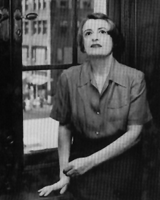
Ayn Rand
is honored with a Premium Paver from Admirers of Ayn Rand: John W. Cooper, Melodee Eby, John Frazier, Ethelmae Humphreys, Belden Mills, George and Marilyn Pearson, and Julie Sheppard.
 1905 - 1982
1905 - 1982
Novelist and philosopher Ayn Rand was born Alissa Rosenbaum on February 2, 1905 in St. Petersburg, Russia. From her earliest years she felt alienated from the dark, brooding atmosphere of Czarist Russia. At age nine she made the conscious decision to become a writer.
In February, 1917 she witnessed the first shots of the Russian Revolution from her balcony. Soon, a Communist gang nationalized her father's shop, reducing her family to crushing poverty. Nurturing a passion to abandon Russia for the West, she obtained a passport to visit Chicago relatives. She left Russia in January, 1926, never to return, and arrived in New York with only $50.00.
After selecting the pen name of Ayn Rand, she moved to Hollywood, got a job as a movie extra and began to write in all her available spare time. Over the next decade, Rand worked at odd jobs and churned out screenplays, short stories, and her first novel, "We the Living," which was as close to an autobiography as she would ever write.
The book that first made her famous was "The Fountainhead" published in 1943. This great novel of American individualism presented Rand's mature portrait of "Man as hero," in the character of architect Howard Roark. It later became a film starring Gary Cooper and Patricia Neal. The novel has remained a bestseller for over half a century.
If "The Fountainhead" created controversy, her next novel, "Atlas Shrugged" fomented a furor. In this gigantic romantic epic, Rand dramatized the major elements of a challenging new philosophy of reason, individualism, and capitalism, which she called, "Objectivism." Her novel asks the question, "Who is John Galt?" Her enthusiastic readers never forget her answer. In this riveting mystery, containing epic-proportion heroes and heroines, she brilliantly writes of the murder - and rebirth - of man's spirit.
After "Atlas Shrugged" appeared in 1957, Rand turned to nonfiction, elaborating her philosophy in essays, columns and speeches. She challenged any government's right to redistribute the fruits of its citizens' labor, believing that charity and generosity are appropriate voluntary actions for individuals and groups to perform toward others. She believed that "charity" from government in any form, to any entity or persons, must necessarily be preceded by theft by government. She believed that if some people are entitled by right to the products of the work of others, then those others are deprived of their rights and condemned to slave labor. She was a relentless critic of any individual, group or government that would initiate the use of force against others, saying, "To deal with men by force is as impractical as to deal with nature by persuasion. One does not and cannot 'negotiate' with brutality. The moral absolute should be: if and when, in any dispute, one side initiates the use of physical force, that side is wrong and no further consideration or discussion of the issues is necessary or appropriate."
Her colorful and productive life ended March 6, 1982, in her New York City home. In the years since her death, interest in her ideas has only increased. Today, she and her philosophy are the focus of books, film documentaries, magazine and newspaper articles, and a growing intellectual movement of scholars, organizations, and publications. Her books continue to sell by the thousands. The difficult task of capturing the essence of "Atlas Shrugged" as a major movie is still being pursued.
For further information about Ayn Rand and her work, please contact the Institute for Objectivist Studies at (800) 374-1776.
Submitted by admirers of Ayn Rand work, including Melodee and Martin Eby, George and Marilyn Pearson, Julie Sheppard, Ethelmae Humphreys, Belden Mills, John Cooper, Ken and Louise Wagnon and others
September 12, 1998










